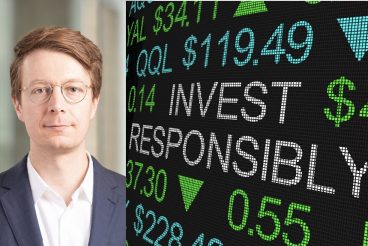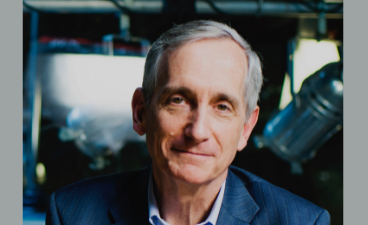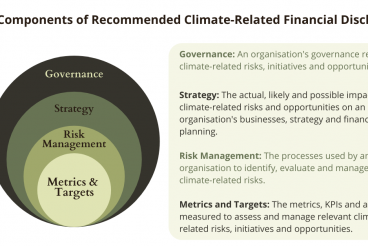This article is the second in a two-part series. If you haven’t already, we highly recommend you check out the first part – COP26 Is Nowhere Near Enough, Here’s How Investing Can Help – before reading this piece.

Is the sustainable finance movement helping to curb climate change by driving up the cost of capital for fossil fuel businesses and other substantial carbon emitters? In the second part of a two-part interview, Florian Heeb, a researcher at the University of Zurich’s Center for Sustainable Finance and Private Wealth, warns that it’s not that simple: He argues that institutional investors have a vested economic interest in taking on advocates of the status quo and pushing governments to make increasingly urgent changes.
An ongoing debate regarding sustainable finance focuses on whether divestment from fossil fuel companies and other businesses responsible for large-scale carbon emissions will drive up their cost of capital to the point that their current business models are no longer viable.
“There’s no doubt that currently fossil fuel companies face a really high cost of capital, which has doubled over the past few years,” says Florian Heeb, a researcher at the University of Zurich’s Center for Sustainable Finance and Private Wealth who specialises in the impact of sustainable investing approaches in the real world, and investors’ sensitivity to impact, among other expertise.
“But the question is why the cost of capital is so high. Is it because investors are divesting, or does it simply reflect new information about climate risks? If it’s the first, further divestment will drive the cost of capital up even more. But if it’s the second, it won’t do much. I tend to believe that the cost of capital reflects increasing climate risks for fossil fuel companies.” Heeb says it is increasingly likely that more countries will take drastic measures on the supply side, obliging producers to keep oil, gas and coal in the ground and destroying the value of these assets. They could also take action on the demand side, for instance, by raising the cost of carbon emissions.

The profit case for fossil fuels

“Things that were unthinkable a few years ago are becoming thinkable now, and that has a huge effect on the cost of capital for fossil fuel companies,” he says. “There is growing scepticism that these companies will be able to continue to generate the huge profits they are enjoying now in another 10 years.”
Heeb argues that even if divestment can drive up the cost of capital, companies are mainly motivated by markets. “As long as there is demand for oil gas and coal, there will be a business in producing it, even if it becomes less profitable because the cost of capital is high.
“We are seeing a shift in ownership of fossil fuel companies away from institutions to hedge funds and private equity firms, which have made a lot of profit in recent years just by acquiring these assets and operating them under the radar. It’s been argued that BP’s sale of its Prudhoe Bay oil field in Alaska oil to a not very well-known entity [unlisted group Hilcorp] may reduce the group’s carbon footprint, but overall it has increased emissions because the new owners do not have the same incentives to keep their operations clean.” He says the political signals are not coming from organisations such as Greenpeace but, rather, from major institutional investors.
“Big finance is coming into sustainable investment, and it changes the political landscape,” he says. “But that will not stop oil, gas and coal being extracted from the ground. However, that change in political will could lead to action (that does stop it).”
Gas and the taxonomy
Heeb is critical of the European Commission’s proposal to incorporate gas into the EU’s green taxonomy as an interim fuel to ease the transition in some countries from coal-fired power generation to renewable energy sources.
“If you want to get to net zero by 2050, there is no role for gas within a very short time,” he says. “You need to go to renewable sources very quickly, and accepting gas as an interim green fuel really doesn’t help. However, there has been a lot of political pressure from governments to accept it into the regulatory framework.”
The inclusion of nuclear energy is a trickier case, he acknowledges. “In terms of carbon, it is clean. After the Fukushima accident in Japan, everyone thought nuclear was dead, with Germany exiting nuclear power very quickly, but we are now seeing a resurgence in its popularity and its promotion as a solution to the climate issue. France as a supplier of the technology has always been a huge proponent.
“We have seen from Fukushima the risks associated with nuclear power are really high, and some people argue that if you insure against major catastrophes, which are unlikely but possible, nuclear power is not competitive at all. I get nervous when people talk about small, modular decentralised nuclear reactors, because it only takes one to have a mishap. Reactors are extremely sensitive, even under the best conditions in western Europe or Japan. But setting the dangers of radiation against climate change is an impossible choice.”
Risk of legislative gridlock
Among the risks to effective decarbonisation worldwide that Heeb identifies, the possibility that action in the US might become stalled by political gridlock sits near, if not at, the top of the list. If the legislative route to decarbonising the economy is closed off, he says, “we are lost. We cannot solve climate change without strong legislative action.
“Net zero targets, sustainable investment, consumers adopting renewables in Europe and parts of the US – these are all great tools for achieving a lower carbon world and a more sustainable economy. But so far, consumer and private sector actions can only take us slowly, step by step in the right direction. It’s nowhere near the scale of change we need to reach net zero in 2050. It’s always the same thing. For the private sector to contribute effectively to resolving climate change, you must set the rules of the game – the private sector cannot do the job alone.”
If the Biden administration’s climate policies lose Congressional support, he says, it will be a huge problem, even if global efforts also enjoy momentum from Europe and China. “The main problem with climate change is the free rider problem. The US can go on its own – you can’t force the US to do anything.
“Nevertheless, most institutional investors have diversified owners that invest in the world economy. They should have a vital interest in pushing for what is best for the world economy. And most institutional investors have a long-term horizon, up to 30 years or even longer. That means taking drastic measures on climate change now, because we will all be better off doing that rather than watching and waiting. The incentive for large diversified institutional investors to use their lobbying power to push for climate legislation is underestimated.”
Addressing inequality
Heeb notes that last June, Swiss voters rejected in a referendum a package of legislative measures designed to curb carbon emissions following a lobbying campaign led by vested interests that included the fossil fuel industry, aviation and automobile dealers.
“One reason we are not seeing the political action needed is because there is still a lot of corporate lobbying trying to slow down progress, for instance pushing stringent carbon pricing down the road,” he says.
“Investors could do much more to curb that lobbying. In the US, companies such as Microsoft are backing groups seeking to block climate action. Investors could have an important role because they do not just represent vested interests, but the wider economy and they are well placed to do so.”
A critical aspect, he argues, is the concept of a just transition. “Climate change has become, especially in the US, a matter of belief and of political orientation,” he says. “But it goes a bit further, as we have seen in France with the gilets jaunes. These protestors have a fair point. We need to raise the cost of fuel, but these people are economically mostly worse off. Climate change is also a problem of inequality, and it is hard to solve one without solving the other.
“In Switzerland, it was people from rural areas who were afraid that the cost of living would go up, whereas advocates of the climate legislation were better educated and earned more. For them, it is less important to pay more for fuel, especially people who live in cities and may not have a car in the first place. For climate measures to be popular, it’s necessary to tackle this inequality. Redistributional carbon taxes that share the benefits with those that are economically less well off will be crucial to creating the new green economy.”
Business as usual?
Heeb is disappointed to find that rather than “building back better” after the Covid-19 pandemic, to a large extent business-as-usual has resumed. “My impression is that we’re pretty much going back to where we started from,” he says. “It was interesting to see how carbon emissions dipped drastically during the first few months of lockdown, but they are going up again now.
“In many areas of economic activity, the pandemic has highlighted fundamentally different ways of doing things. But overall, it has not affected the economy as much as predicted, especially in western Europe. It has shown that patterns of consumption do not need to be directly connected to mobility and to carbon emissions – that we can change things drastically without destroying the economy. It suggests the costs may not be as high as opponents suggest.
“Today, Zurich is again flooded with personal cars burning fossil fuels. But it could be transformed into another Amsterdam full of bicycle lanes. If you define the wealth of a country in a more qualitative way, incorporating the wellbeing of individuals and the environment, there are many ways in which we could change things that would make people better off, but it has a lot to do with how we measure progress and economic wellbeing.”
Thirst for expertise
Heeb rues the failure of authorities in the US and worldwide to act on climate change when its implications first became clear, as long as 40 years ago (chronicled by Nathaniel Rich in his book Losing Earth: The Decade We Almost Stopped Climate Change). He says: “That is the tragedy we are in, the status quo is so powerful. People are used to things working the way they have always worked. If we had started 20 years ago… Of course, climate science has improved a lot, and we know much more, but the direction was always clear.
“But 20 years it was just on the fringe of people’s attention. Now it is at centre-stage, but I fear it will take another five to 10 years before large parts of the population really realise how urgent it is. Today every product claims to be sustainable, every company has a net zero target to save the world, but it will take a few more years not just to acknowledge the situation but to make a real contribution to changing it.”
However, he believes there are some positive signs. “In Europe the SFDR has created a huge demand in the financial industry for expertise on sustainability. Ten years ago, sustainable finance was more marginal. Some people were drawing up a green marketing strategy but now it is becoming a compliance issue. Financial institutions are really nervous about whether their green products are compatible with the new taxonomy framework.
“As sustainable investment grows in Europe, institutions are becoming jumpier about whether they are compliant. It has created huge demand for expertise on sustainability, impact and ESG among asset managers and banks but also regulators to gain access to the latest insights. The rules have resulted in the industry dealing with sustainability in a more effective way. Investors too are seeking to learn more about the topic and to engage, pushing companies to come up with more adequate answers on impact and sustainability.
— — —
Florian Heeb is a researcher at the Center for Sustainable Finance and Private Wealth (CSP) at the University of Zurich. He explores the real-world impact of sustainable investing and how investors integrate impact into their decision-making. Besides his research, Florian serves as a member of the board of directors of ESG-AM, a Zurich based asset manager focused on impact and sustainability.
Before joining CSP, Florian served in the executive management of South Pole, a market leader in carbon trading and sustainability consulting, lastly acting as Chief Operating Officer. From previous positions at myclimate, ProNatura, and the Swiss Federal Institute of Aquatic Science and Technology, Florian brings a broad understanding understanding of corporate sustainability, environmental change and climate policy.
We hope you found this article useful. It is part of VitalBriefing’s Sustainability Matters content series, in which we speak with experts across every facet of sustainability, ESG, sustainable finance, impact investing and more. Stay tuned for more insight from thought leaders.
If you or a colleague are interested in participating in the series, please get in touch by emailing eschrieberg@vitalbriefing.com.





